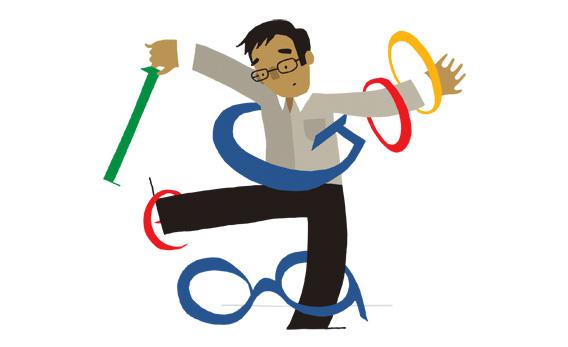It was astonishingly easy to quit Googling. In Chrome, Google’s Web browser, I clicked a couple buttons in the Settings tab, and voilà, my default search engine was Bing. The great thing about Chrome is that it remembers your preferences across all your computers—I only needed to switch to Bing on my desktop, and there it was on my laptop, too. (Thank you, Google!) I made the same change on my iPhone and my iPad. The whole thing took 15 seconds and came without any advanced planning or any weighing of the potential downsides. I switched to Bing on a lark—and I’ve stuck with it, for better or worse, for a week.
What attracted me at first was purely aesthetic. Last week, I saw a picture of Bing’s redesigned results page, and I was smitten. The new Bing is like the old Google—your results are presented on a clean, uncluttered page consisting of a lot of links and a few unobtrusive ads. The design suggests prim efficiency and utility, qualities I’ve always associated with Google. But Google has changed. Over the last year, the world’s best search engine has gotten tarted up with “social results.” Now, by default, logged-in users see links and photos suggested by friends, and references to Google’s social network, Google+, are ever present on the page. Even if you turn off social search—it’s one of the many buttons near the top of the page—Google’s results are still nowhere as clean as Bing’s. Look at the two side by side for the same query:
What’s it like to Bing instead of Google? First, consider that I am a heavy Googler. I’ve been using the search engine for more than a decade, and I’d say I turn to it 30 or 40 times a day at minimum. I’ve used Google so much that its quirks and shortcuts have become lodged in my brain, and I suspected that switching would require a painful adjustment period. Many people feel this way. In the tech press, threatening to switch to Bing is universally recognized to be an empty gesture, kind of like promising to jet off to Canada if your favored presidential candidate doesn’t win. However bad things get over here, the thinking goes, no one would ever seriously consider doing that.
But Bing isn’t nearly as strange as Canada. In the first few hours after making it my default engine, I barely noticed that anything was different. And after a week with Bing, I can say that changing search engines was one of the least arduous product switches I’ve ever made. Going from Google to Bing requires far less of an adjustment than moving from a PC to a Mac or from Facebook to Google+. It’s not even as big a shift as ditching Coke for Pepsi. Instead, it’s on the order of switching from Tide to the supermarket brand. There are some differences between the two, but only obsessives will notice that anything is off. Almost everyone else will feel right at home with Bing.
All that being said, I don’t think you should switch. For one thing, despite Bing’s better design, Google is unquestionably the better search engine. Of the hundreds of searches I conducted in the last week, there were a handful of times that Bing just didn’t seem to be giving me the answer I was looking for. When I turned to Google with the same query, I got better results. This happened once when I was researching the name of a real estate agent; Google turned up some alarming stuff that Bing didn’t catch. Another time, I was looking for a computer scientist who’s an expert on wearable computing. I found a page and contact info for him on Bing, but I got a bounceback when I e-mailed him. When I Googled him, I found an indication that he’d moved on to a new job, with newer contact info—a page that Bing hadn’t turned up in its top results.
Google was better in other tiny ways as well. Sometimes I’d search for a place—the Peets coffee shop near my house, a specific street address—and Bing would fail to show me a link to Bing Maps at the top of its results page. Google always directed me to a Maps page, saving me a step. Bing also doesn’t offer “instant” search, the Google feature that updates results as you type. And most damning of all, I didn’t happen upon any area where Bing is clearly superior to Google. Over lots and lots of searches, Bing mostly worked really well, and one or two times, it didn’t.
The most striking thing about switching to Bing was how enmeshed I remained in the Google universe. During my week with Bing, I found myself reaching for lots of Google products beyond its Web search engine—Gmail, YouTube, Google Calendar, Google Books, Google Scholar, Chrome, Picasa, and probably a few others I’m forgetting. My editor challenged me to go without using any Google products at all. Could I survive even a day without anything made in Mountain View? I tried. I redirected my mail to Hotmail, I tried to abstain from YouTube, and I attempted to research obscure topics without using Scholar. But I couldn’t do it. Google’s just too good—even beyond search, its products are too useful, too central to the Web to get much accomplished without them. I lasted less than half a day without Google, and it was hell.
And that’s the biggest case against switching to Bing. If you’re never really going to escape Google—and if Bing is pretty much exactly like Google—what’s the point? Yes, Google and Bing are functionally identical. But Bing will need a lot more than parity with the most-popular search engine in the land if it wants people to switch en masse.
